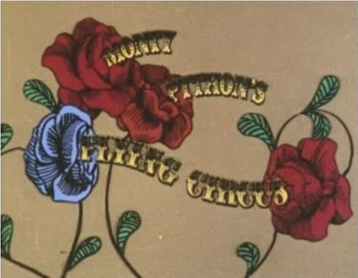
FROM WIKIPEDIA COMMONS
Monty Python’s Flying Circus (also known as simply Monty Python) is a British surreal sketch comedy series created by and starring Graham Chapman, John Cleese, Eric Idle, Terry Jones, Michael Palin and Terry Gilliam, who became known as “Monty Python“, or the “Pythons”. The first episode was recorded at the BBC on 7 September 1969 and premiered on 5 October on BBC1, with 45 episodes airing over four series from 1969 to 1974, plus two episodes for German TV.
The series stands out for its use of absurd situations, mixed with risqué and innuendo-laden humour, sight gags and observational sketches without punchlines. Live action segments were broken up with animations by Gilliam, often merging with the live action to form segues. The overall format used for the series followed and elaborated upon the style used by Spike Milligan in his groundbreaking series Q5, rather than the traditional sketch show format. The Pythons play the majority of the series characters themselves, along with supporting cast members including Carol Cleveland (referred to by the team as the unofficial “Seventh Python”), Connie Booth (Cleese’s first wife), series producer Ian MacNaughton, Ian Davidson, musician Neil Innes, and Fred Tomlinson and the Fred Tomlinson Singers for musical numbers.[1][2]
The programme came about as the six Pythons, having met each other through university and in various radio and television programmes in the 1960s, sought to make a new sketch comedy show unlike anything else on British television at the time. Much of the humour in the series’ various episodes and sketches targets the idiosyncrasies of British life, especially that of professionals, as well as aspects of politics. Their comedy is often pointedly intellectual, with numerous erudite references to philosophers and literary figures and their works. The team intended their humour to be impossible to categorise, and succeeded (although, by their perspective, failed) so completely that the adjective “Pythonesque” was invented to define it and, later, similar material. However, their humour was not always seen as appropriate for television by the BBC, leading to some censorship during the third series. Cleese left the show following that series, and the remaining Pythons completed a final shortened fourth series before ending the show.
The show became very popular in the United Kingdom, and after initially failing to draw an audience in the United States, gained American popularity after Public Broadcasting Service member stations began airing the show in 1974. The success on both sides of the Atlantic led to the Pythons going on live tours and creating three additional films, while the individual Pythons flourished in solo careers. Monty Python’s Flying Circus has become an influential work on comedy as well as the ongoing popular culture.
TODAY’S ALMANAC
Question of the Day
What kind of car was James Dean driving when he was killed in 1955?
He was driving a rare silver Porsche Spyder. Only 90 of them were in existence at the time of his death.
Advice of the Day
Toasting increases the flavor of sesame, mustard, and cumin seeds.
Home Hint of the Day
Do not paper over existing wallpaper. Remove all the old material and make sure the surface is smooth before you begin applying the new covering. This will ensure a neat, professional-looking job.
Word of the Day
Perihelion
The point in a planet’s orbit that is closest to the Sun.
Puzzle of the Day
(Blank) is (Blank) day. (What’s the saying? Fill in the blanks!)
1) Tomorrow 2) another
Born
- Jonathan Edwards (philosopher) – 1703
- Chester Arthur (21st U.S. president) – 1829
- Louis Lumiere (inventor) – 1864
- Robert Hutchings Goddard (physicist) – 1882
- Larry Fine (actor) – 1902
- Ray Arthur Kroc (American businessman) – 1902
- Joshua Logan (producer) – 1908
- Bil Keane (cartoonist, created Family Circus) – 1922
- Glynis Johns (actress) – 1923
- Richard F. Gordon (astronaut) – 1929
- Steve Miller (musician) – 1943
- Karen Allen (actress) – 1951
- Bernie Mac (actor) – 1958
- Mario Lemieux (hockey player) – 1965
- Kate Winslet (actress) – 1975
- Nicky Hilton (heiress) – 1983
Died
- Tecumseh (Native American leader) – 1813
- Nancy Hanks Lincoln (mother of U.S. President Abraham Lincoln) – 1818
- Earl Tupper (inventor of Tupperware) – 1983
- Rodney Dangerfield (comedian & actor) – 2004
Events
- World Series first broadcast on radio– 1921
- Laura Ingalls made the first transcontinental airplane flight by a woman. Traveling from New York to California in 4 days, she stopped 9 times and logged 30 hours and 27 minutes of flying time– 1930
- First nonstop trans-Pacific flight, from Japan to Washington, which had begun on October 4, was completed on this day– 1931
- During the first televised presidential address, President Truman asked Americans to not eating meat on Tuesdays or poultry on Thursdays in order to help stockpile grain for starving people outside of the U.S.– 1947
- The Beatles released their hit Love Me Do in the U.K.– 1962
- Tom Green’s jet car reached 413.199 mph– 1964
- Monty Python’s Flying Circus first appeared on the British Broadcasting Corporation’s BBC-1– 1969
- Laurie Skreslet first Canadian to summit Mt. Everest– 1982
- First space shuttle launch with oceanographer (Paul Scully-Power on Challenger)– 1984
- Marc Garneau became the first Canadian in space– 1984
- 14th Dalai Lama, Tenzin Gyatso, won Nobel Peace prize– 1989
- 53 people committed murder-suicide simultaneously in several chalets in Switzerland and Canada. They were members of the Order of the Solar Temple– 1994
Weather
- Mighty tempest in New England, said John Winthrop’s journal entry for this day– 1638
- Pumpkin Flood on Susquehanna and Delaware Rivers in Pennsylvania– 1786
- Arizona set a U.S. record high temperature for October with 116 degrees F (in Sentinel)– 1917
COURTESY www.almanac.com
